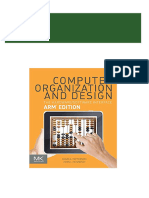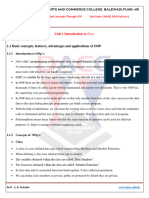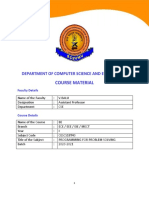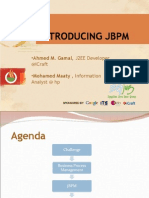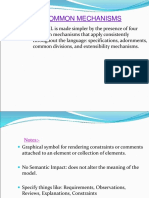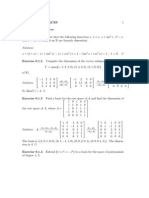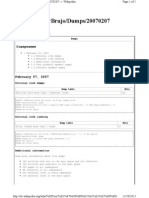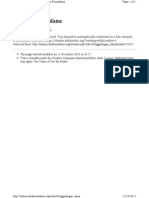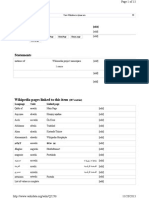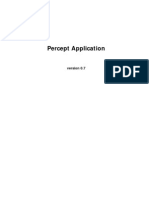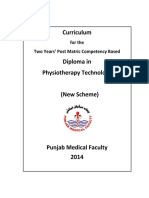CS56 Advanced Java Programming
Uploaded by
Skyezine Via Kit FoxCS56 Advanced Java Programming
Uploaded by
Skyezine Via Kit FoxCS 56, Advanced Java Programming - syllabus
Page 1 of 5
CS 56 Advanced Java Programming
Fall 2001
J. Ken Geddes, Jr. 310/434-4628 BUS 220T Office Hours: 5:05p - 6:05p M in B231; 5:45p - 6:45p TTh; and by appointment and email
kengeddes@earthlink.net http://home.earthlink.net/~kengeddes/
Class Info
Section 4171 6:45p - 9:50p Th BUS 201 Arrange - 2 hours 3 units Transfer: CSU Prerequisite: CS 55
Course Description
This course continues where CS 55 leaves off in developing mastery of the Java programming language and its extensive Application Programming Interface (API). Topics covered include exceptions, multithreading, multimedia, input/output (I/O), Java Database Connectivity (JDBC), servlets, Remote Method Invocation (RMI), and networking.
Course Objectives
Upon completion of this course the student will be able to: 1. 2. 3. 4. use all features of the Java programming language use most of the packages in the core Java API trace the activity of a program using the contour model complete at least 10 well-written Java programs
CS 56 Website
Point your browser to my homepage http://home.earthlink.net/~kengeddes Then take the link to CS 56, Advanced Java Programming. This website contains this syllabus, assignment information, announcements and reminders, examples, links to Java development resources, and other pertinent information. I will make extensive use of the website to communicate with you. You are responsible for awareness of the information posted there.
Sending Email To Me
The following format is required in the Subject line: CS 56section lastName, firstName. E.g., Subject: CS 56 Th Smith, James
Required Text
Java How to Program, Third Edition, Deitel & Deitel, Prentice Hall, 1999.
References
http://home.earthlink.net/~kengeddes/cs56/syllabus.html
4/26/2012
CS 56, Advanced Java Programming - syllabus
Page 2 of 5
1. Thinking in Java, 2nd edition, Bruce Eckel, Prentice-Hall, June 2000. This is considered by many to be the best book there is on Java. There are over 400 examples, all clearly explained line by line in the text. You can download both the text and the examples for free. 2. The Java Tutorial: Object-Oriented Programming for the Internet, Mary Campione and Kathy Walrath. Addison-Wesley, September, 1996. 720 pp., $39.76, ISBN: 0-20-1634546. Also available for free online at http://java.sun.com/docs/books/tutorial/. Both a reference and a tutorial, it was originally designed to be read online and is continually being updated. Very well-written, detailed explanations make this book especially good for less experienced programmers.
Tests
There will be four tests. They will be based on material from the textbook, lectures, and assignments. The lowest test score will be dropped. Makeup tests will not be given. If more than one test is missed they will remain as zeros.
Grading
3 tests 70% homework 20% team project 10% Total 100%
Letter Grade
90 - 100% 80 - 89% 70 - 79% 60 - 69% 0 - 59% A B C D F
Attendance
There will be assigned seating and attendance will be taken. Very important: If you miss class, it is your responsibility to find out what you missed. It would be very helpful to get the phone numbers or email addresses of a few classmates so you can get missed information. Everything is subject to change and will be announced in class. Please do not expect the instructor to repeat lecture material because you missed a class. For chronic absence I will reduce the final calculated grade at my discretion (usually by one letter). If you enroll please attend; if you dont attend please dont enroll.
Lab / Homework Assignments
Assignments are always due in one week at the start of class. You may turn in an assignment late by the start of the next class; the lateness penalty is one point. Any homework turned in after that will receive no credit. Homework due the day of a test will not be accepted late. You are encouraged to help each other with the lab assignments; however, if you simply copy someone else's work, points will be deducted from both students' scores for plagiarism. Homework will be graded as follows: 3 - good to excellent, 2 - significant error(s), 1 - missed
http://home.earthlink.net/~kengeddes/cs56/syllabus.html
4/26/2012
CS 56, Advanced Java Programming - syllabus
Page 3 of 5
more than half of the requirements, 0 - pretty much worthless.
Method of Presentation
Lecture and discussion solving problems from original statement to solution, demonstration and analysis of existing problem solutions through flowcharting and tracing, and discussion of the strengths and weaknesses of different algorithms.
Academic Honesty
The academic honesty policy of Santa Monica College will be strictly enforced. See Code of Academic Conduct in the Student Planning Guide for Success.
Disabilities, Medical Problems
Accommodations will be made for disabilities; see me regarding such or medical problems.
Team Projects
You are expected to participate in a team project. You may organize your team any way you like. One way is user, designer, coder, and tester. Another way is an architect / chief programmer with a team of programmers each of whom works on one part of the program. Your team will make two presentations. The project shall consist of the design, development, test, debug, and presentation to the class of some Java program of your choice. This is a good opportunity to solve a problem of interest to you, to be creative, and to show the fruits of your labor to the class.
Study Habits
Please take pride in your work and do not turn in garbage. Learning to program in Java requires goodly amounts of logical talent, preparedness, time, and effort. Plan to study and write code for at least 2.5 hours outside of class for each hour in class. This course is demanding and time consuming, but the reward is that at the end of this course you will have a good foundation in Java programming.
Policy on disputed scores for tests, assignments, etc.
Occasionally a student may feel he has received an incorrect or unfair score for his work. If you feel this is the case, you may ask me to grade your work a second time. Understand that your score may go up or down in this case. Understand, too, that partial credit is at the discretion of the instructor. Whether an error deserves, say, a half point or a full point deduction depends on the instructor's standards and point allocation for that program. If there is some particular line of code that you insist is correct but for which points were deducted, I will re-examine the code. If you are right, your score will be increased by the deducted number of points times two. If you are wrong, your score will be decreased (a second time) by the deducted number of points. If you still refuse to accept the instructor's judgement, the burden of proof is on you to show that your code is correct. Typically, this will require running the program, or a small test program that proves your point, in the lab.
http://home.earthlink.net/~kengeddes/cs56/syllabus.html
4/26/2012
CS 56, Advanced Java Programming - syllabus
Page 4 of 5
Week# Date 1 08/30 2 09/06 3 09/13 4 09/20 5 09/27 6 10/04 7 10/11 8 10/18 9 10/25 10 11/01 11 11/08 12 11/15 11/22 13 11/29 14 12/06 15 12/13
Chapter / Topic Syllabus; 14 - Exception Handling 15 - Multithreading 16 - Multimedia: Images, Animation, Audio and Video 17 - Files and Streams 18 - Java Database Connectivity 19 - Servlets
Lab Assg'd. lab14 lab15 lab16 lab17 lab18 lab19
Proj. Due
Test
test 1
20 - Remote Method Invocation Review; project teamwork 21 - Networking 22 - Data Structures 23 - Java Utilities Package and Bit Manipulation Review; project teamwork Legal Holiday 24 - Collections 25 - JavaBeans 6:45p - 9:45p
lab20 Part 1 lab21 lab22 lab23 test 3 test 2
lab24
Part 2
test 4
http://home.earthlink.net/~kengeddes/cs56/syllabus.html
4/26/2012
CS 56, Advanced Java Programming - syllabus
Page 5 of 5
Course Topics and Tentative Schedule
CS 56 Home Email Last Modified November 2, 2001
http://home.earthlink.net/~kengeddes/cs56/syllabus.html
4/26/2012
You might also like
- (Ebook PDF) Computer Organization and Design ARM Edition: The Hardware Software Interface All Chapters Instant Download100% (6)(Ebook PDF) Computer Organization and Design ARM Edition: The Hardware Software Interface All Chapters Instant Download51 pages
- DTRF - 150215 - General Welding ConditionsNo ratings yetDTRF - 150215 - General Welding Conditions15 pages
- Notes CA403 Object Oriented Programming Using C SybbacaNo ratings yetNotes CA403 Object Oriented Programming Using C Sybbaca49 pages
- Bellack A.s., Hersen M. Eds. Comprehensive Clinical Psychology Volume 3 2000No ratings yetBellack A.s., Hersen M. Eds. Comprehensive Clinical Psychology Volume 3 2000367 pages
- Programming Fundamentals Lab 05 (Nested If-Else and If-Else-If Statements)No ratings yetProgramming Fundamentals Lab 05 (Nested If-Else and If-Else-If Statements)4 pages
- r20 4-1 Open Elective III Syllabus Final WsNo ratings yetr20 4-1 Open Elective III Syllabus Final Ws29 pages
- Unit - III:Circuit Characterization and Performance EstimationNo ratings yetUnit - III:Circuit Characterization and Performance Estimation21 pages
- Idea Submission Form: Institution's Innovation CouncilNo ratings yetIdea Submission Form: Institution's Innovation Council5 pages
- CSB353: Compiler Design Lab: Project ReportNo ratings yetCSB353: Compiler Design Lab: Project Report15 pages
- Practical No-6 Aim:-To Study Uml (Unified Modelling Language)No ratings yetPractical No-6 Aim:-To Study Uml (Unified Modelling Language)9 pages
- 2023S - IP - Old - Questions (ITPEC Test)No ratings yet2023S - IP - Old - Questions (ITPEC Test)37 pages
- Computer Programming and Utilization - 2110003 PDF50% (2)Computer Programming and Utilization - 2110003 PDF5 pages
- Big Data Analysis - Lab Manual - Bharathidasan University - B.Sc Data Science, Second Year, 4th SemesterNo ratings yetBig Data Analysis - Lab Manual - Bharathidasan University - B.Sc Data Science, Second Year, 4th Semester41 pages
- Principles of Programming Language-Unit 1No ratings yetPrinciples of Programming Language-Unit 162 pages
- Download ebooks file Game Programming with Unity and C#: A Complete Beginner’s Guide 1st Edition Casey Hardman all chapters100% (5)Download ebooks file Game Programming with Unity and C#: A Complete Beginner’s Guide 1st Edition Casey Hardman all chapters40 pages
- Course Guide Big Data University College Groningen: Academic Year 2020/2021, Semester Ib 1. General InformationNo ratings yetCourse Guide Big Data University College Groningen: Academic Year 2020/2021, Semester Ib 1. General Information6 pages
- Computer Science 1321: Java For Programmers Section 100, Fall 2021No ratings yetComputer Science 1321: Java For Programmers Section 100, Fall 20218 pages
- Cps211 - Object-Oriented Software DevelopmentNo ratings yetCps211 - Object-Oriented Software Development7 pages
- Файл:Nadschmuddin Gotzinski.jpg: expired and its author is anonymousNo ratings yetФайл:Nadschmuddin Gotzinski.jpg: expired and its author is anonymous4 pages
- Tables of Contents - 1916 To 2013: Virtual Special IssuesNo ratings yetTables of Contents - 1916 To 2013: Virtual Special Issues4 pages
- Welcome To Wikipedia,: From Today's Featured Article in The NewsNo ratings yetWelcome To Wikipedia,: From Today's Featured Article in The News4 pages
- Accomplishment Report December 2018 MatrixNo ratings yetAccomplishment Report December 2018 Matrix1 page
- The Impact of Active Learning StrategiesNo ratings yetThe Impact of Active Learning Strategies22 pages
- Van Manen-1984-Practicing Phenomenological WritingNo ratings yetVan Manen-1984-Practicing Phenomenological Writing34 pages
- Reflections On Two Year B.ed. Curriculum of GGSIPU Challenges and SuggestionsNo ratings yetReflections On Two Year B.ed. Curriculum of GGSIPU Challenges and Suggestions6 pages
- Industrial Revolution - Lesson Plan Grade 12No ratings yetIndustrial Revolution - Lesson Plan Grade 125 pages
- m1 Cm3 Field Tenor Mode Framework GledhillNo ratings yetm1 Cm3 Field Tenor Mode Framework Gledhill10 pages
- Challenges Facing Implementation of The Competency Based Curriculum in Kenya: An Urban ViewNo ratings yetChallenges Facing Implementation of The Competency Based Curriculum in Kenya: An Urban View14 pages
- Chapter 4 Thesis PUP Sta Maria Bulacan PDFNo ratings yetChapter 4 Thesis PUP Sta Maria Bulacan PDF13 pages
- Educational Sociology - Education and Different Society PDFNo ratings yetEducational Sociology - Education and Different Society PDF11 pages
- Operations Research Template Subject IntroductionNo ratings yetOperations Research Template Subject Introduction5 pages
